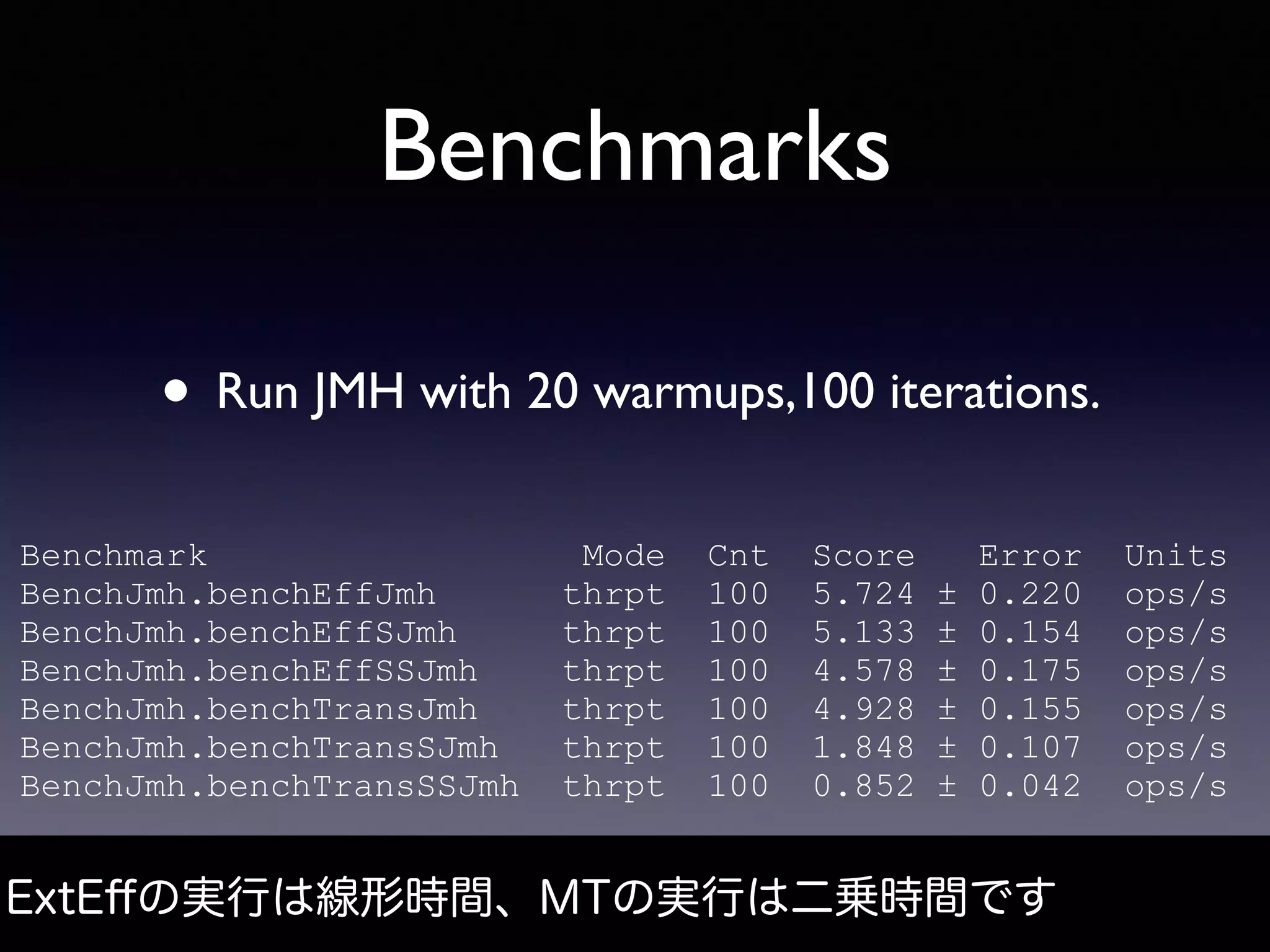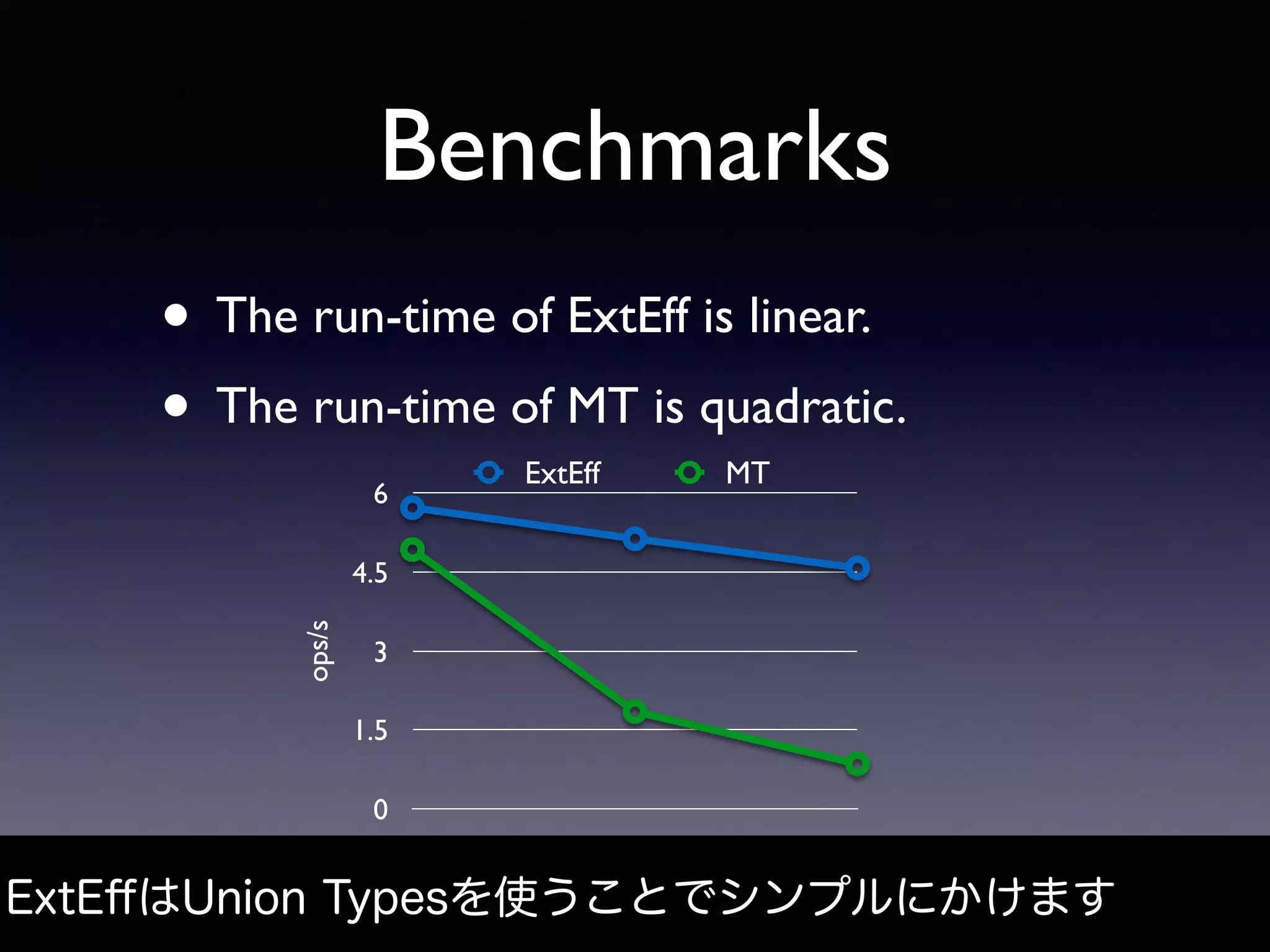This document discusses extensible effects in Dotty, a next generation compiler for Scala. It introduces key concepts like Freer monads, which use free functors to represent effects without constraints, and Fast Freer which improves performance using type-aligned queues. Extensible Effects (ExtEff) is implemented as Freer applied to an open union, allowing different effects to be composed. This provides an extensible way to define computations with side effects in Dotty.

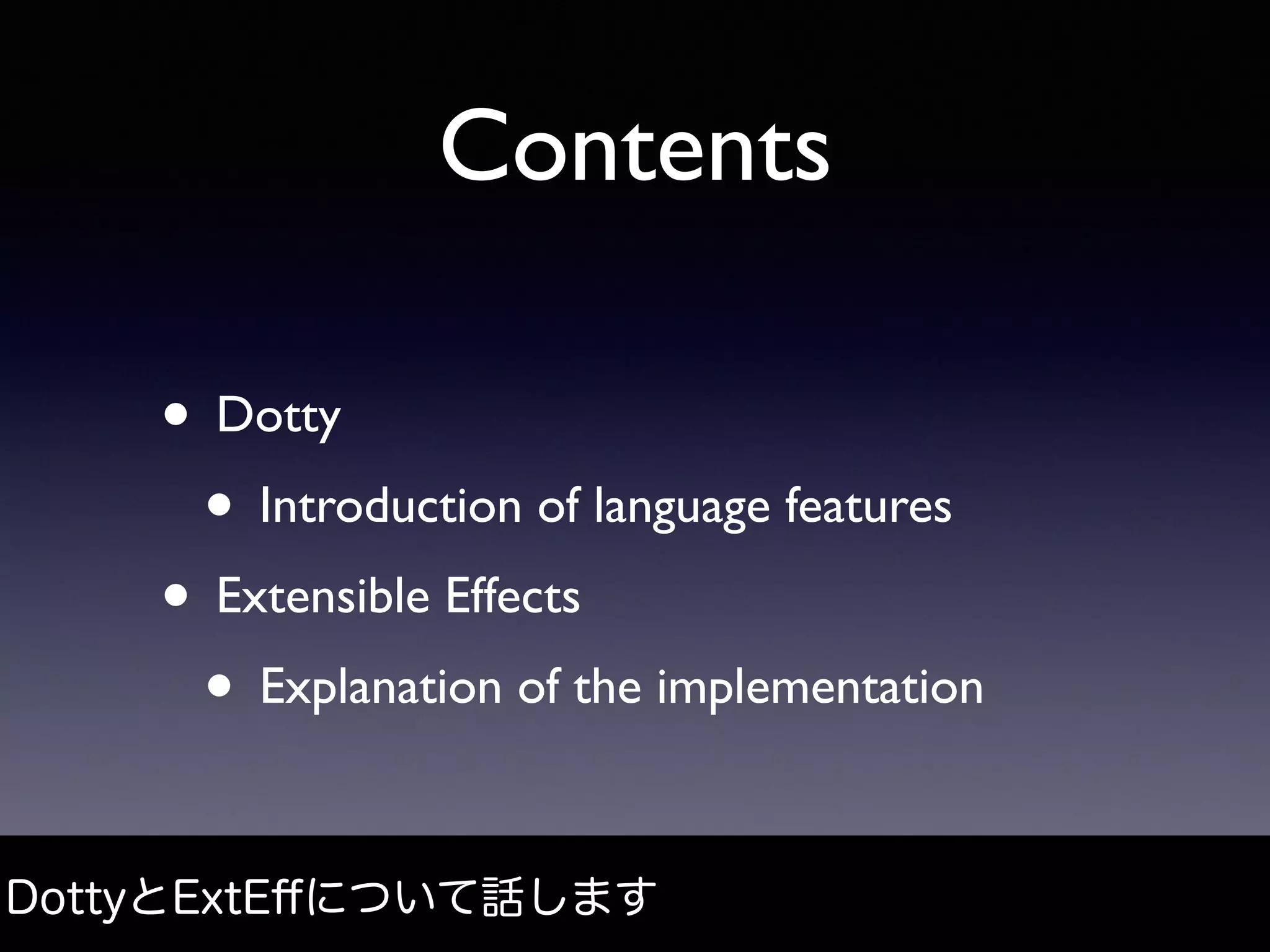
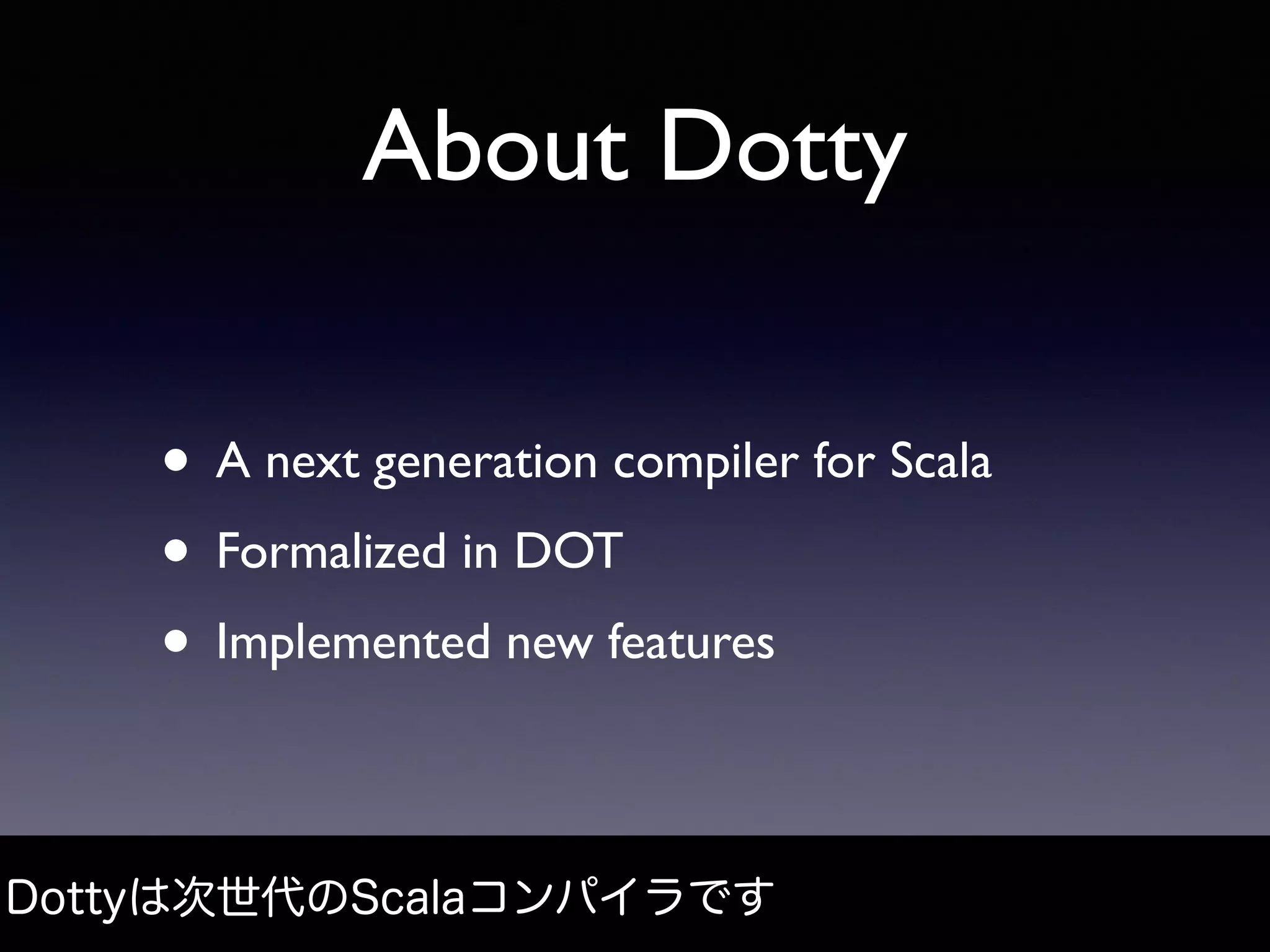
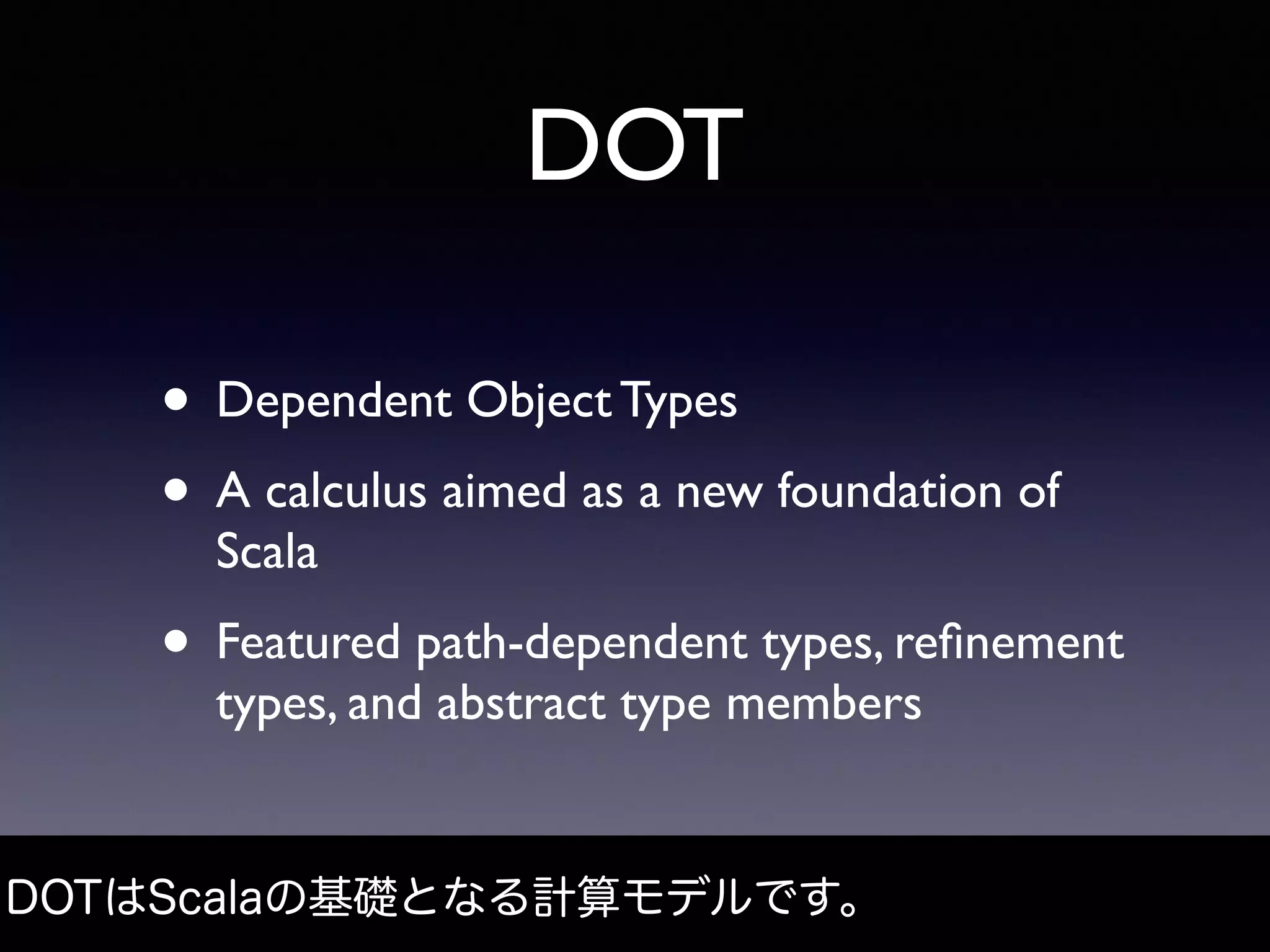
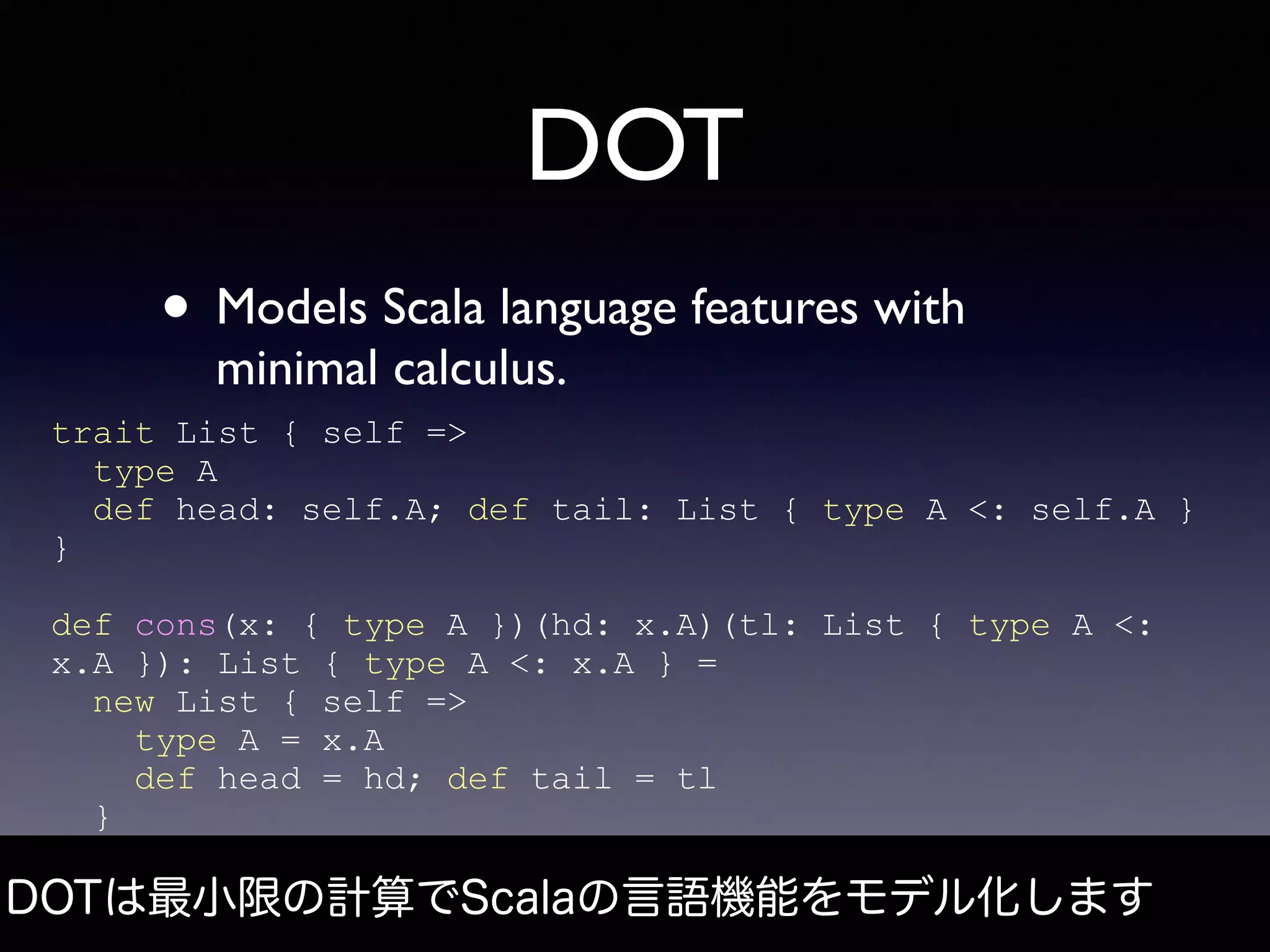

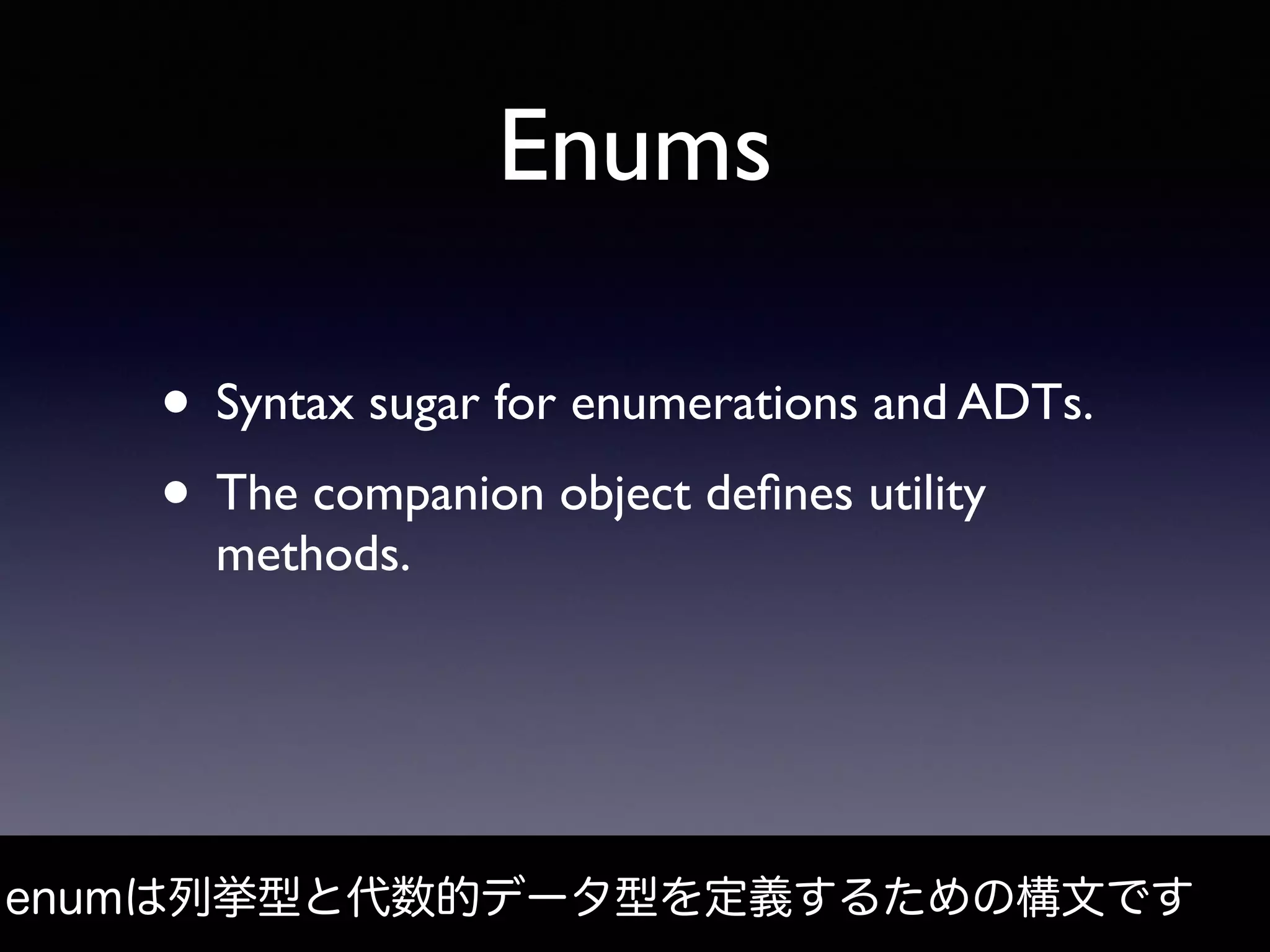
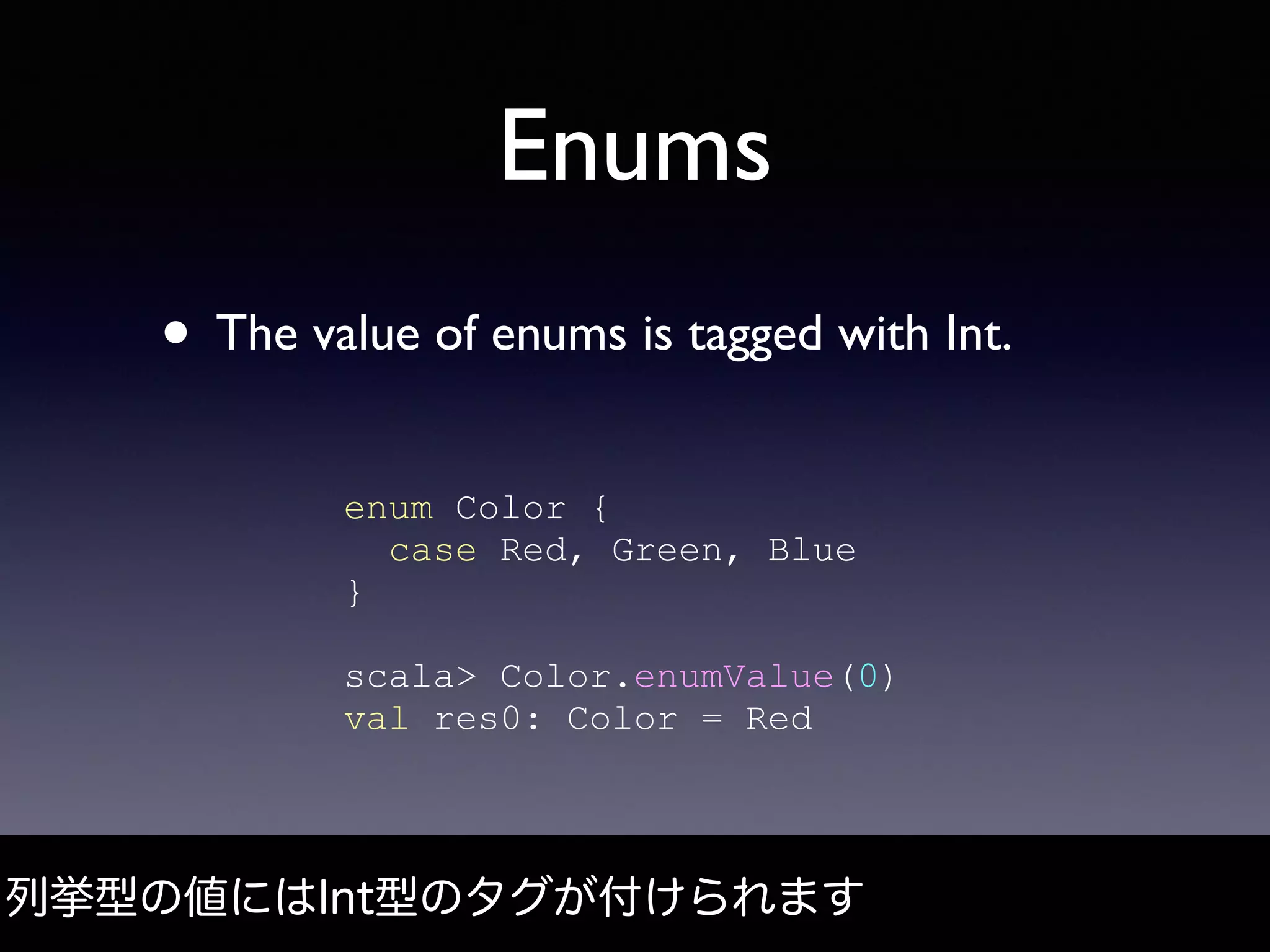
![Enums
• The `enum` supports ADTs.
• ADTs can define fields and methods.
enumキーワードは代数的データ型をサポートします
enum Option[+A] {
case Some(a: A)
case None
def isEmpty: Boolean = this == None
}](https://image.slidesharecdn.com/scalamatsuri-180317071400/75/Extensible-Effects-in-Dotty-9-2048.jpg)
![Type Lambdas
• Representation of higher-kinded types.
Type lambdaは高階型を表現します
type Pair = [A] => (A, A)
val p: Pair[Int] = (0, 1)](https://image.slidesharecdn.com/scalamatsuri-180317071400/75/Extensible-Effects-in-Dotty-10-2048.jpg)
![Type Lambdas
• Possible to write partial application of type
directly
型の部分適用を直接書けるようになりました
// Scala2
type FreeMonad[F[_]] =
Monad[({ type λ[A] = Free[F, A] })#λ]
// Dotty
type FreeMonad[F[_]] = Monad[[A] => Free[F, A]]](https://image.slidesharecdn.com/scalamatsuri-180317071400/75/Extensible-Effects-in-Dotty-11-2048.jpg)

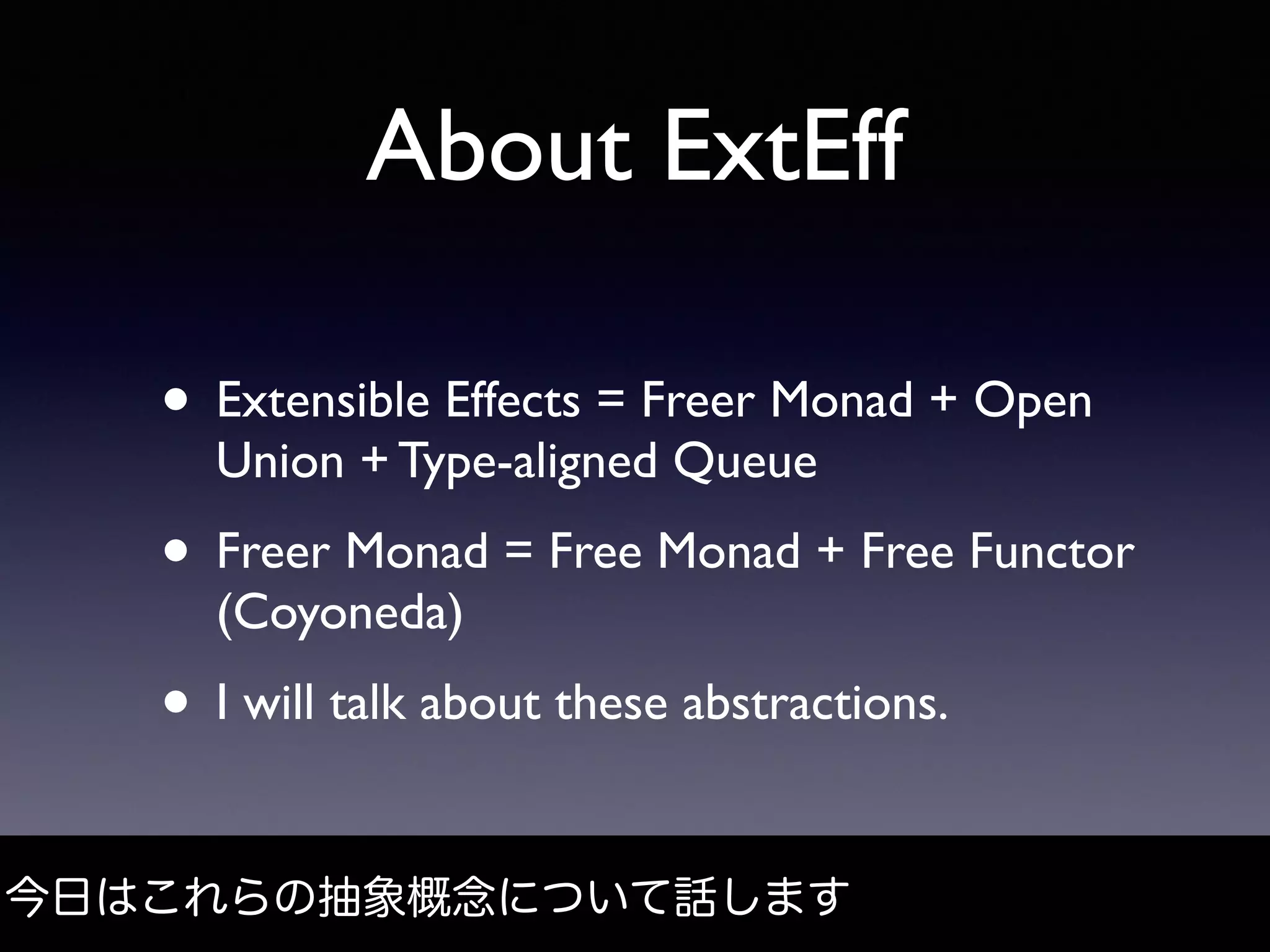


![Definition of Free
Pureは純粋な計算でImpureは副作用付きの計算を表します
• Pure is a pure computation.
• Impure is a computation with side-effects.
enum Free[F[_], A] {
case Pure(a: A)
case Impure(ffree: F[Free[F, A]])
}
def lift(fa: F[A])(implicit F: Functor[F]): Free[F, A] =
Impure(F.map(fa)(a => Pure(a)))](https://image.slidesharecdn.com/scalamatsuri-180317071400/75/Extensible-Effects-in-Dotty-16-2048.jpg)
![Free Monad
• flatMap has the constraint that F is Functor
flatMapはFがFunctorである制約を持ちます
enum Free[F[_], A] {
def flatMap[B](f: A => Free[F, B])(implicit F:
Functor[F]): Free[F, B] =
this match {
case Pure(a) => f(a)
case Impure(ffree) =>
F.map(ffree)(free => free.flatMap(f))
}
}](https://image.slidesharecdn.com/scalamatsuri-180317071400/75/Extensible-Effects-in-Dotty-17-2048.jpg)

![Free Writer
• Definition of Writer monad by Free.
FreeによるWriterモナドの定義です
type Writer[W, A] = Free[[T] => Tell[W, T], A]
// Effect is described CPS
case class Tell[W, A](w: W, a: A) {
def map[B](f: A => B) = Tell(w, f(a))
}
def tell[W](w: W): Writer[W, Unit] =
Free.lift(Tell(w, ()))](https://image.slidesharecdn.com/scalamatsuri-180317071400/75/Extensible-Effects-in-Dotty-19-2048.jpg)
: (List[W], A) =
free match {
case Free.Pure(a) => (Nil, a)
case Free.Impure(Tell(w, free)) =>
runAsList(free).map {
case (ws, a) => (w :: ws, a)
}
}](https://image.slidesharecdn.com/scalamatsuri-180317071400/75/Extensible-Effects-in-Dotty-20-2048.jpg)
: (Vector[W], A) =
{
def go(acc: Vector[W], free: Writer[W, A]):
(Vector[W], A) =
free match {
case Free.Pure(a) => (acc, a)
case Free.Impure(Tell(w, free)) =>
go(acc :+ w, free)
}
go(Vector.empty, free)
}](https://image.slidesharecdn.com/scalamatsuri-180317071400/75/Extensible-Effects-in-Dotty-21-2048.jpg)
![Free Writer
• Multiple interpretations can be made for
one expression.
一つの式に対して複数の解釈が可能です
val e = for {
_ <- tell("hoge")
_ <- tell("fuga")
} yield ()
scala> runAsList(e)
val res0: (List[String], Unit) = (List(hoge, fuga),())
scala> runAsVec(e)
val res1: (Vector[String], Unit) = (Vector(hoge, fuga),
())](https://image.slidesharecdn.com/scalamatsuri-180317071400/75/Extensible-Effects-in-Dotty-22-2048.jpg)



![Definition of Coyoneda
• FMap has a signature similar to map.
FMapはmapと似たシグネチャをもちます
enum Coyoneda[F[_], A] {
case FMap[F[_], A, B](fa: F[A], k: A => B) extends
Coyoneda[F, B]
}
def lift[F[_], A](fa: F[A]): Coyoneda[F, A] =
Coyoneda.FMap(fa, a => a)](https://image.slidesharecdn.com/scalamatsuri-180317071400/75/Extensible-Effects-in-Dotty-26-2048.jpg)
![Coyoneda Functor
• Coyoneda becomes a functor without
constraints.
Coyonedaは制約なしにファンクタになります
enum Coyoneda[F[_], A] {
def map[B](f: A => B): Coyoneda[F, B] =
this match {
case Coyoneda.FMap(fi, k) =>
Coyoneda.FMap(fi, k andThen f)
}
}](https://image.slidesharecdn.com/scalamatsuri-180317071400/75/Extensible-Effects-in-Dotty-27-2048.jpg)

val box = Coyoneda.lift(Box(0))
.map(i => i + 1)
.map(i => i.toString)](https://image.slidesharecdn.com/scalamatsuri-180317071400/75/Extensible-Effects-in-Dotty-28-2048.jpg)

![Definition of Freer
• Expands the definition of Free Coyoneda.
• Impure has a signature similar to flatMap.
Free Coyonedaの定義を展開したものです
enum Freer[F[_], A] {
case Pure(a: A)
case Impure[F[_], A, B](fa: F[A], k: A => Freer[F, B])
extends Freer[F, B]
}
def lift[F[_], A](fa: F[A]): Freer[F, A] =
Impure(fa, a => Pure(a))](https://image.slidesharecdn.com/scalamatsuri-180317071400/75/Extensible-Effects-in-Dotty-30-2048.jpg)
![Freer Monad
• flatMap is a free from constraints of
Functor.
flatMapからFunctorの制約がなくなりました
enum Freer[F[_], A] {
def flatMap[B](f: A => Freer[F, B]): Freer[F, B] =
this match {
case Freer.Pure(a) => f(a)
case Freer.Impure(fa, k) =>
Freer.Impure(fa, a => k(a).flatMap(f))
}
}](https://image.slidesharecdn.com/scalamatsuri-180317071400/75/Extensible-Effects-in-Dotty-31-2048.jpg)

![Type-aligned Queue
• FTCQ is a sequence of functions.
• It is implemented with a tree.
FTCQは関数の列を表します
val `A => F[C]`: FTCQ[F, A, C] =
Node(
Leaf(f: A => F[B]),
Leaf(g: B => F[C])
)](https://image.slidesharecdn.com/scalamatsuri-180317071400/75/Extensible-Effects-in-Dotty-33-2048.jpg)
![Type-aligned Queue
• The composition of functions is constant-
time.
• The application of function is stack-safe.
合成は定数時間で、適用はスタックセーフに行われます
val `A => F[D]`: FTCQ[F, A, D] =
Node(
`A => F[C]`,
Leaf(h: C => F[D])
)](https://image.slidesharecdn.com/scalamatsuri-180317071400/75/Extensible-Effects-in-Dotty-34-2048.jpg)
![Definition of Fast Freer
• Impure represents a continuation with
FTCQ.
Impureは継続をFTCQで表現します
type Arrs[F, A, B] = FTCQ[[T] => Freer[F, T], A, B]
enum Freer[F[_], A] {
case Pure(a: A)
case Impure[F[_], A, B](fa: F[A], k: Arrs[F, A, B])
extends Freer[F, B]
}](https://image.slidesharecdn.com/scalamatsuri-180317071400/75/Extensible-Effects-in-Dotty-35-2048.jpg)
![Fast Freer Monad
• flatMap is constant-time.
flatMapは定数時間で実行されます
enum Freer[F[_], A] {
def flatMap[B](f: A => Freer[F, B]): Freer[F, B] =
this match {
case Freer.Pure(a) => f(a)
case Freer.Impure(fa, k) =>
Freer.Impure(fa, k :+ f)
}
}](https://image.slidesharecdn.com/scalamatsuri-180317071400/75/Extensible-Effects-in-Dotty-36-2048.jpg)
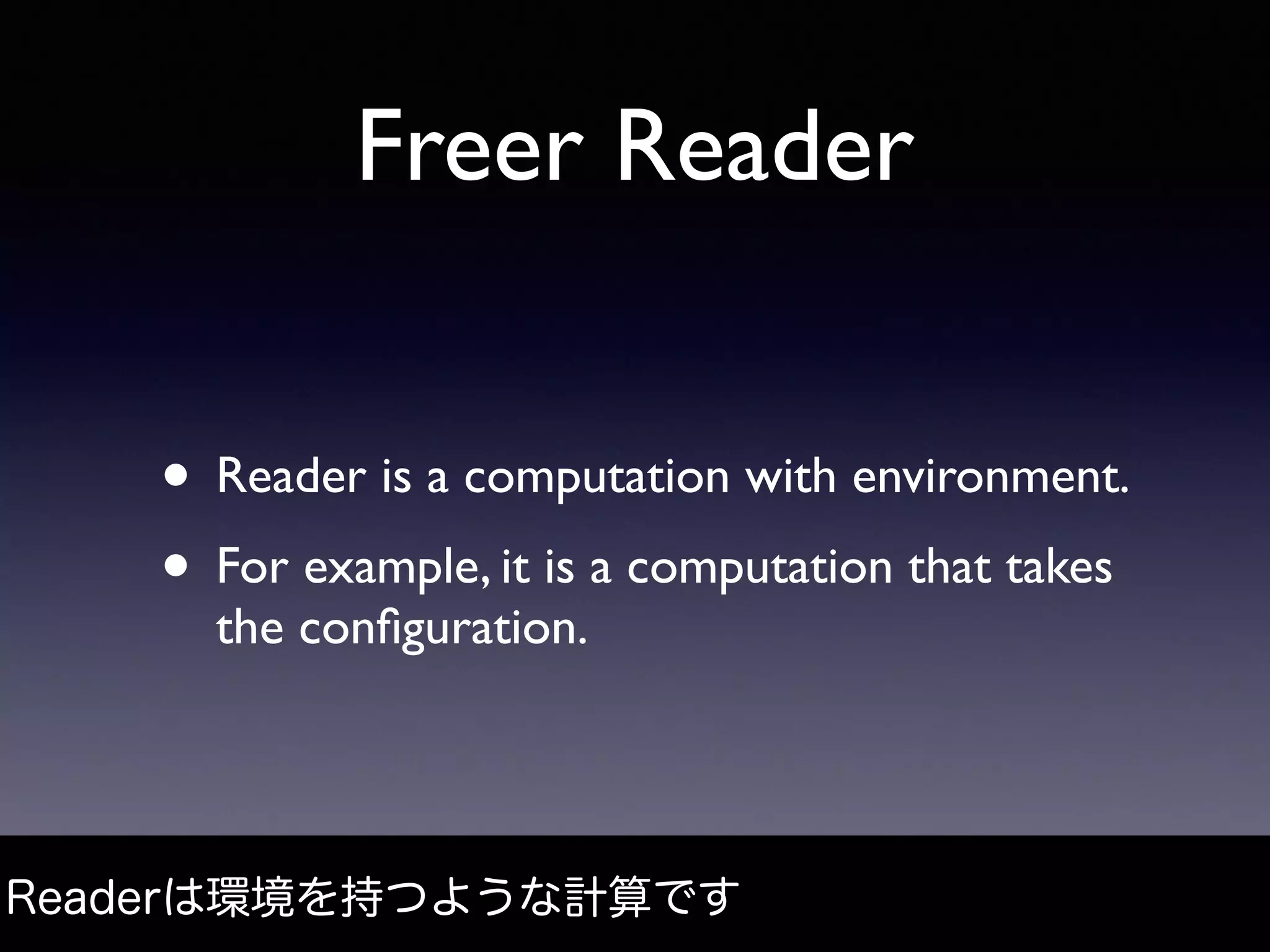
![Freer Reader
• Definition of Reader monad by Freer.
FreerによるReaderモナドの定義です
type Reader[I, A] = Freer[[T] => Ask[I, T], A]
case class Ask[I, A](k: I => A)
def ask[I]: Reader[I, I] =
Freer.lift(Ask(i => i))](https://image.slidesharecdn.com/scalamatsuri-180317071400/75/Extensible-Effects-in-Dotty-38-2048.jpg)
: A =
freer match {
case Freer.Pure(a) => a
case Freer.Impure(Ask(f), k) =>
runReader(k(f(i)), i)
}](https://image.slidesharecdn.com/scalamatsuri-180317071400/75/Extensible-Effects-in-Dotty-39-2048.jpg)
![Freer Reader
• An example of a Reader monad.
Readerモナドの例です
val e = for {
x <- ask[Int]
y <- ask[Int]
} yield x + y
scala> runReader(e, 1)
val res0: Int = 2](https://image.slidesharecdn.com/scalamatsuri-180317071400/75/Extensible-Effects-in-Dotty-40-2048.jpg)



![Open Union
• Union seems to be a higher-kinded type
version of Either.
Unionは高階型を使ったEitherのような定義です
enum Union[F[_], G[_], A] {
case Inl(value: F[A])
case Inr(value: G[A])
}](https://image.slidesharecdn.com/scalamatsuri-180317071400/75/Extensible-Effects-in-Dotty-44-2048.jpg)
![Open Union
• An alias for writing in infix notation is
useful.
中置記法で記述するための別名があると便利です
type :+:[F[_], G[_]] = [A] => Union[F, G, A]
type ListOrOption = List :+: Option :+: Nothing](https://image.slidesharecdn.com/scalamatsuri-180317071400/75/Extensible-Effects-in-Dotty-45-2048.jpg)
![Member
MemberはUnionに値をinjectします
trait Member[F[_], R[_]] {
def inject[A](fa: F[A]): R[A]
}
• Member injects a value into an union.](https://image.slidesharecdn.com/scalamatsuri-180317071400/75/Extensible-Effects-in-Dotty-46-2048.jpg)
![Member
• It is uniquely derived if a value is in Inl.
値がInlにあることでインスタンスを一意に導出できます
implicit def leftMember[F[_], G[_]] =
new Member[F, F :+: G] {
def inject[A](fa: F[A]) = Union.Inl(fa)
}
implicit def rightMember[F[_], G[_], H[_]](implicit F:
Member[F, H]) =
new Member[F, G :+: H] {
def inject[A](fa: F[A]) = Union.Inr(F.inject(fa))
}](https://image.slidesharecdn.com/scalamatsuri-180317071400/75/Extensible-Effects-in-Dotty-47-2048.jpg)
![Member
• An example of constructing Union using
Member.
Memberを使ってUnionを構成する例です
def inject[F[_], R[_], A](fa: F[A])(implicit F:
Member[F, R]): R[A] =
F.inject(fa)
scala> val opt: ListOrOption[Int] = inject(Option(0))
val opt: ListOrOption[Int] = Inr(Inl(Some(0)))](https://image.slidesharecdn.com/scalamatsuri-180317071400/75/Extensible-Effects-in-Dotty-48-2048.jpg)
![Definition of ExtEff
• lift injects effects using Member.
liftはMemberを使ってエフェクトを注入します
enum Eff[R[_], A] {
case Pure(a: A)
case Impure[R[_], A, B](union: R[A], k: Arrs[F, A, B])
extends Eff[R, B]
}
def lift[F[_], R[_], A](fa: F[A])(implicit F: Member[F,
R]): Eff[R, A] =
Impure(F.inject(fa), Arrs(a => Pure(a)))](https://image.slidesharecdn.com/scalamatsuri-180317071400/75/Extensible-Effects-in-Dotty-49-2048.jpg)
![ExtEff Writer
コンストラクタからモナドの値が決まります
• No longer necessary to write in CPS.
• A value of a monad is determined from the
constructor.
enum Writer[W, A] {
case Tell[W](w: W) extends Writer[W, Unit]
}
def tell[R[_], W](w: W)(implicit ev: Member[[A] =>
Writer[W, A], R]): Eff[R, Unit] = Eff.lift(Tell(w))](https://image.slidesharecdn.com/scalamatsuri-180317071400/75/Extensible-Effects-in-Dotty-50-2048.jpg)
![ExtEff Reader
プリミティブの関数はコンストラクタを持ち上げるだけです
• Primitive functions only lifts constructors.
enum Reader[I, A] {
case Ask[I]() extends Reader[I, I]
}
def ask[R[_], I](implicit ev: Member[[A] => Reader[I,
A], R]): Eff[R, I] = Eff.lift(Ask[I])](https://image.slidesharecdn.com/scalamatsuri-180317071400/75/Extensible-Effects-in-Dotty-51-2048.jpg)
![ExtEff Reader
• If another effect appears, transfer it.
他のエフェクトがあらわれた場合は処理を移譲します
def runReader[R[_], I, A](eff: Eff[([T] => Reader[I, T])
:+: R, A], i: I): Eff[R, A] =
eff match {
case Eff.Pure(a) => Free.Pure(a)
case Eff.Impure(Union.Inl(Reader.Ask()), k) =>
runReader(k(i), i)
case Eff.Impure(Union.Inr(r), k) =>
Eff.Impure(r, a => runReader(k(a), i))
}](https://image.slidesharecdn.com/scalamatsuri-180317071400/75/Extensible-Effects-in-Dotty-52-2048.jpg)
![ExtEff Handler
• Handlers can be generalized.
ハンドラは一般化することができます
def handleRelay[F[_], R[_], A, B]
(eff: Eff[F :+: R, A])
(pure: A => Eff[R, B])
(bind: F[A] => (A => Eff[R, B]) => Eff[R, B])
: Eff[R, B] = eff match {
case Eff.Pure(a) => pure(a)
case Eff.Impure(Union.Inl(fa), k) =>
bind(fa)(a => handleRelay(k(a))(pure)(bind))
case Eff.Impure(Union.Inr(r), k) =>
Eff.Impure(r, a => handleRelay(k(a))(pure)(bind))
}](https://image.slidesharecdn.com/scalamatsuri-180317071400/75/Extensible-Effects-in-Dotty-53-2048.jpg)
![ExtEff Writer
• Just write pure and flatMap with a handler.
handleRelayを使えばpureとflatMapを書くだけです。
def runWriter[R[_], W, A](eff: Eff[([T] => Writer[W, T])
:+: R, A]): Eff[R, (List[W], A)] =
handleRelay(eff)(a => (Nil, a)) {
case Writer.Tell(w) =>
k => k(()).map { case (ws, a) => (w :: ws, a) }
}](https://image.slidesharecdn.com/scalamatsuri-180317071400/75/Extensible-Effects-in-Dotty-54-2048.jpg)
: A =
eff match {
case Eff.Pure(a) => a
}
エフェクトがNothingならImpureのインスタンスは存在しない](https://image.slidesharecdn.com/scalamatsuri-180317071400/75/Extensible-Effects-in-Dotty-55-2048.jpg)
![ExtEff Example
• You can write two monads in one ‘for’
二つのモナドを一つのfor式に書けます
def e[R[_]](implicit r: Member[[T] => Reader[Int, T],
R], w: Member[[T] => Writer[Int, T], R]): Eff[R, Int] =
for {
x <- Reader.ask
_ <- Writer.tell(x + 1)
} yield x](https://image.slidesharecdn.com/scalamatsuri-180317071400/75/Extensible-Effects-in-Dotty-56-2048.jpg)
![ExtEff Example
• To run the Eff requires explicit monad stack
実行にはエフェクトスタックの明示が必要です
type Stack = ([T] => Reader[Int, T]) :+: ([T] =>
Writer[Int, T]) :+: Nothing
scala> run(runWriter(runReader(e[Stack], 0))))
val res0: (List[Int], Int) = (List(1),0)](https://image.slidesharecdn.com/scalamatsuri-180317071400/75/Extensible-Effects-in-Dotty-57-2048.jpg)
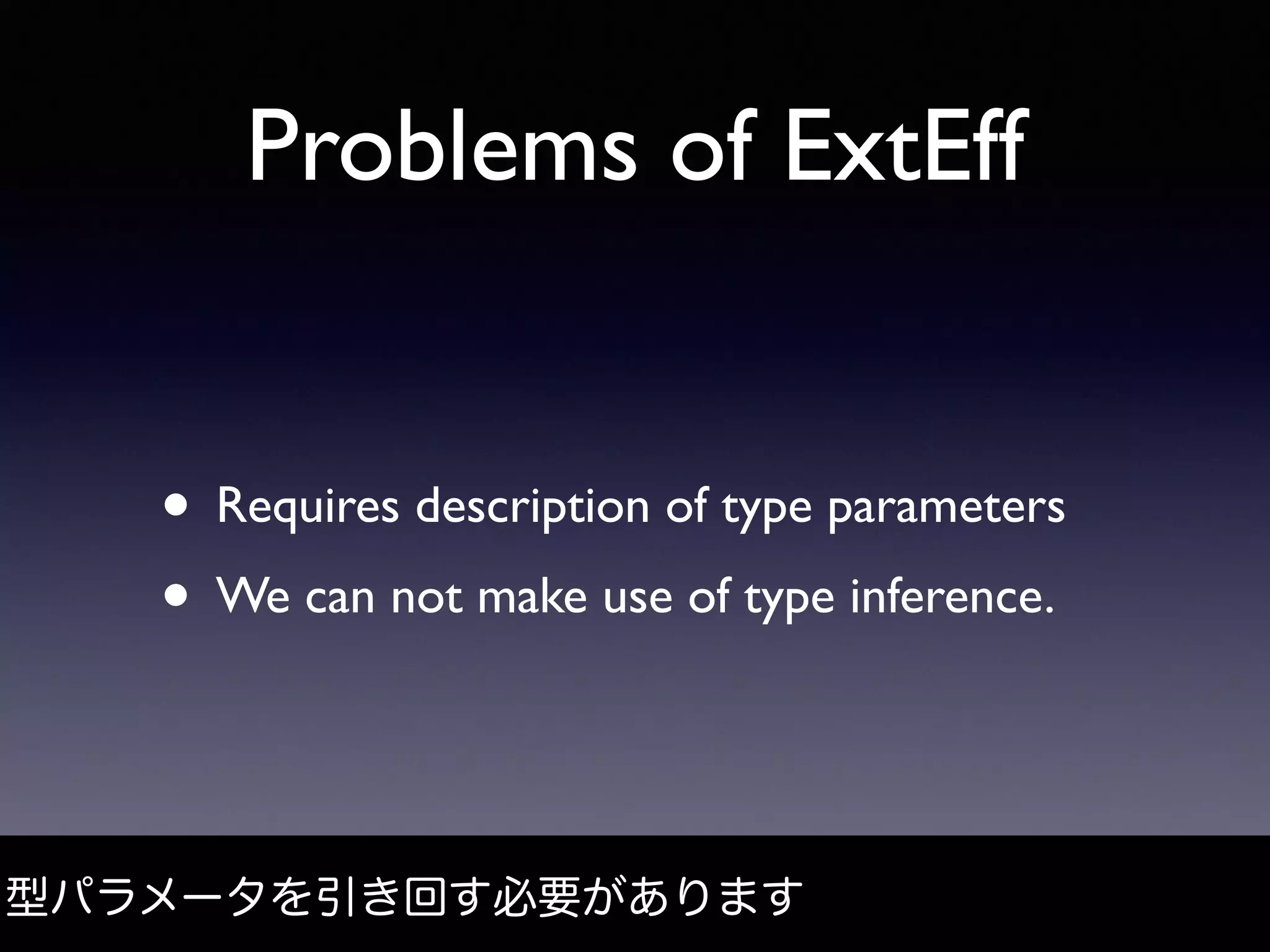
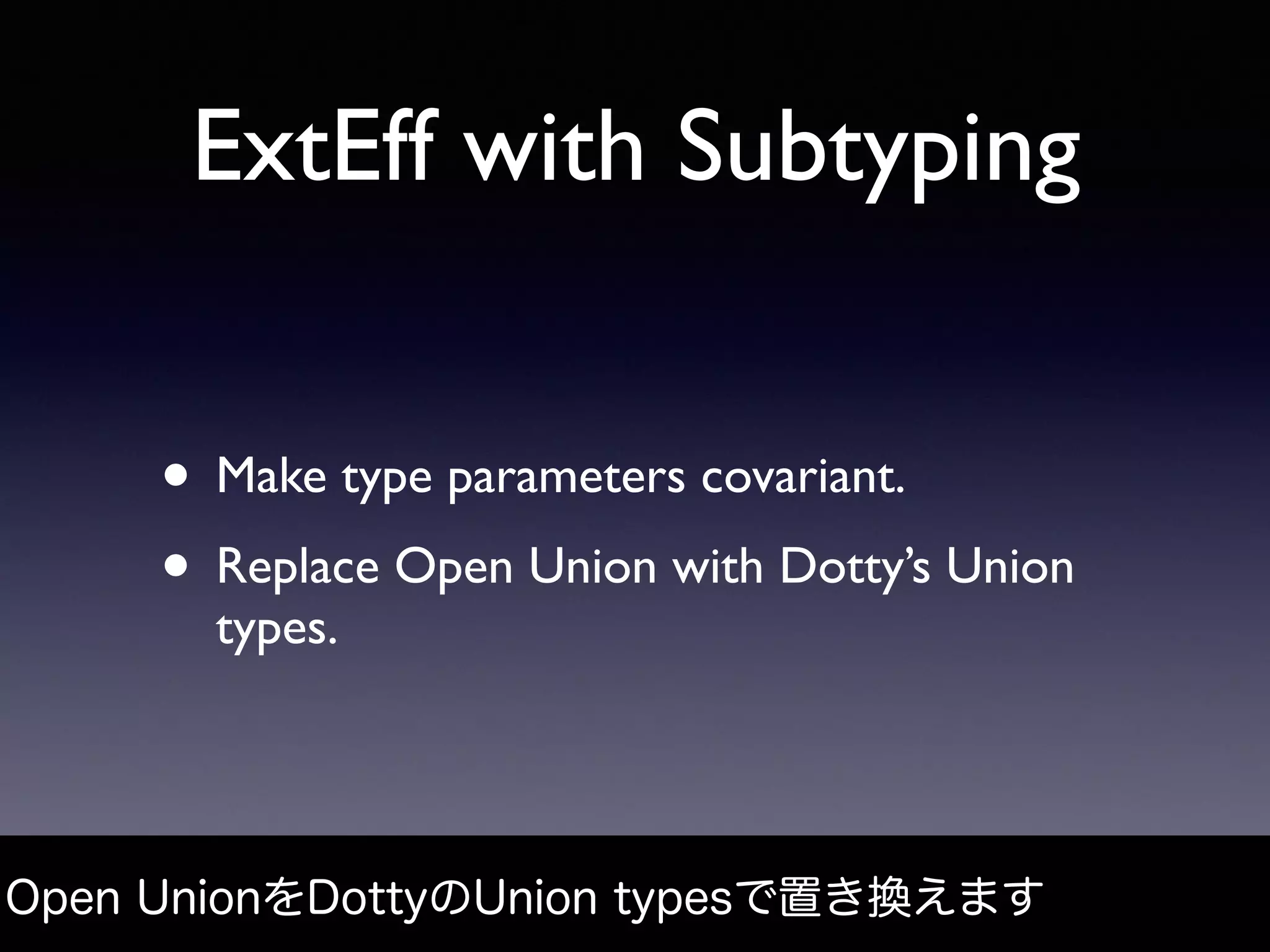
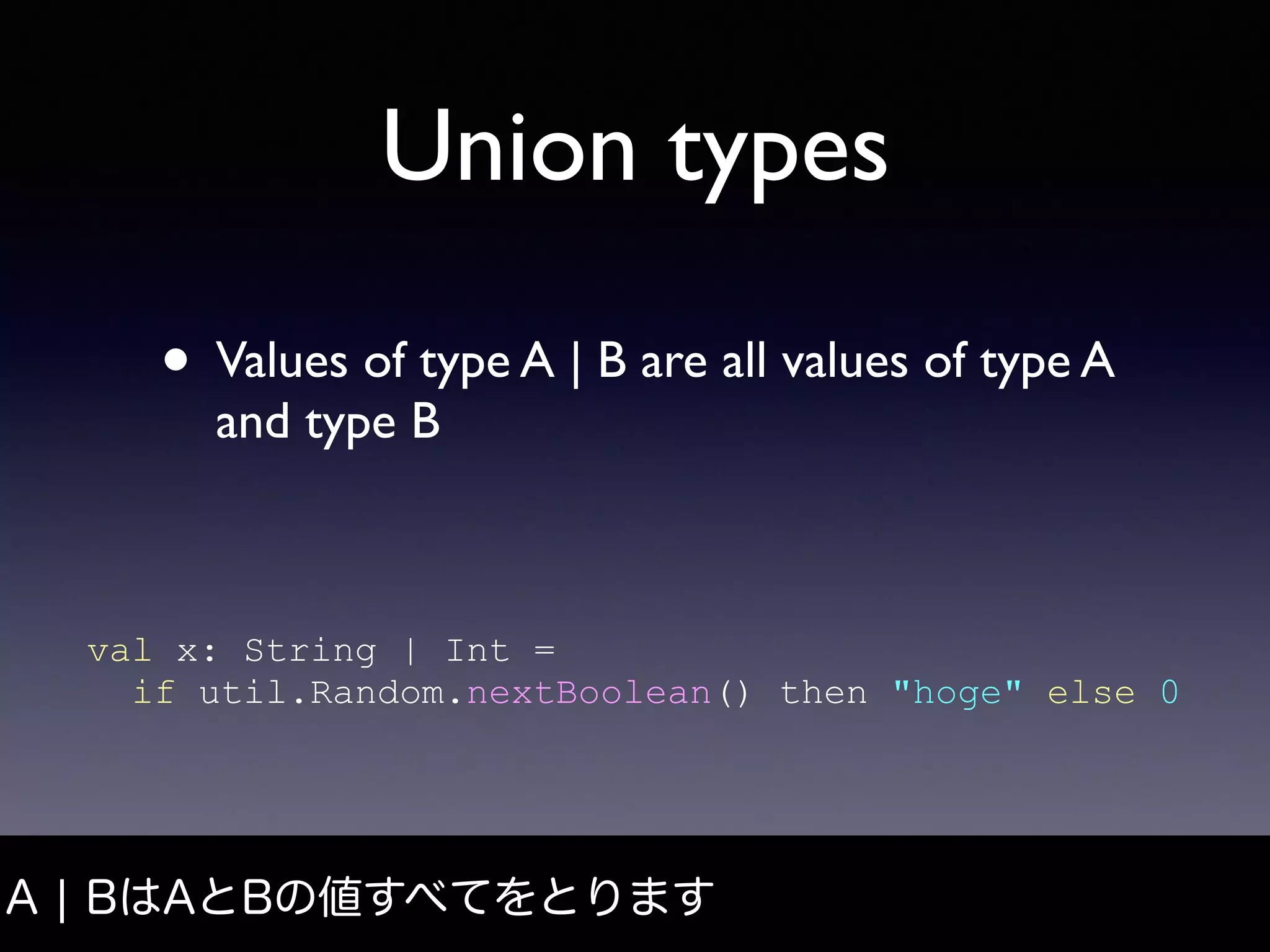

object Union {
def apply[F[_], A](value: F[A])(implicit F: Tag[F]) =
new Union(F, value)
}](https://image.slidesharecdn.com/scalamatsuri-180317071400/75/Extensible-Effects-in-Dotty-61-2048.jpg)
![Tag
• Tag is implemented with ClassTag.
• It makes unique identifiers from types.
case class Tag[F[_]](value: String)
object Tag {
implicit def __[F[_, _], T](implicit F: ClassTag[F[_,
_]], T: ClassTag[T]): Tag[[A] => F[T, A]] =
Tag(s"${F}[${T}, _]")
}
型から一意な識別子を作ります](https://image.slidesharecdn.com/scalamatsuri-180317071400/75/Extensible-Effects-in-Dotty-62-2048.jpg)
![New ExtEff
• The type parameter R becomes covariant.
• Impure is replaced Open Union with Tagged
Union.
ImpureはOpen UnionをTagged Unionで置き換えます
enum Eff[+R[_], A] {
case Pure(a: A)
case Impure[R[_], A, B](union: Union[R[A]], k: Arrs[R,
A, B]) extends Eff[R, B]
}
def lift[F[_]: Tag, A](fa: F[A]): Eff[F, A] =
Impure(Union(fa), a => Pure(a))](https://image.slidesharecdn.com/scalamatsuri-180317071400/75/Extensible-Effects-in-Dotty-63-2048.jpg)
![New ExtEff
• flatMap returns an union of effects.
flatMapはエフェクトの和を返します
enum Eff[+R[_], A] {
def flatMap[S[_], B](f: A => Eff[S, B])
: Eff[[T] => R[T] | S[T], B] =
this match {
case Eff.Pure(a) => f(a)
case Eff.Impure(u, k) =>
Eff.Impure(u, k :+ f)
}
}](https://image.slidesharecdn.com/scalamatsuri-180317071400/75/Extensible-Effects-in-Dotty-64-2048.jpg)
![New Handler
• Uses Tag to identify an effect.
Tagを使ってエフェクトを識別します
def handleRelay[F[_], R[_], A, B]
(eff: Eff[[T] => F[T] | R[T], A])
(pure: A => Eff[R, B])
(flatMap: F[A] => (A => Eff[R, B]) => Eff[R, B])
(implicit F: Tag[F]): Eff[R, B] =
eff match {
case Eff.Pure(a) => pure(a)
case Eff.Impure(Union(`F`, fa: F[A]), k) =>
flatMap(fa)(a => handleRelay(k(a))(pure)(flatMap))
case Eff.Impure(u: Union[R[A]], k) =>
Eff.Impure(r, a => handleRelay(k(a))(pure)(flatMap))
}](https://image.slidesharecdn.com/scalamatsuri-180317071400/75/Extensible-Effects-in-Dotty-65-2048.jpg)
![New ExtEff Example
• You can write more simply.
• Type inference works.
よりシンプルな記述が可能になりました
val e: Eff[[T] => Reader[Int, T] | Writer[Int, T], Int]
=
for {
x <- Reader.ask[Int]
_ <- Writer.tell(x + 1)
} yield x
scala> run(runWriter(runReader(e, 0)))
val res0: (Int, Int) = (1,0)](https://image.slidesharecdn.com/scalamatsuri-180317071400/75/Extensible-Effects-in-Dotty-66-2048.jpg)
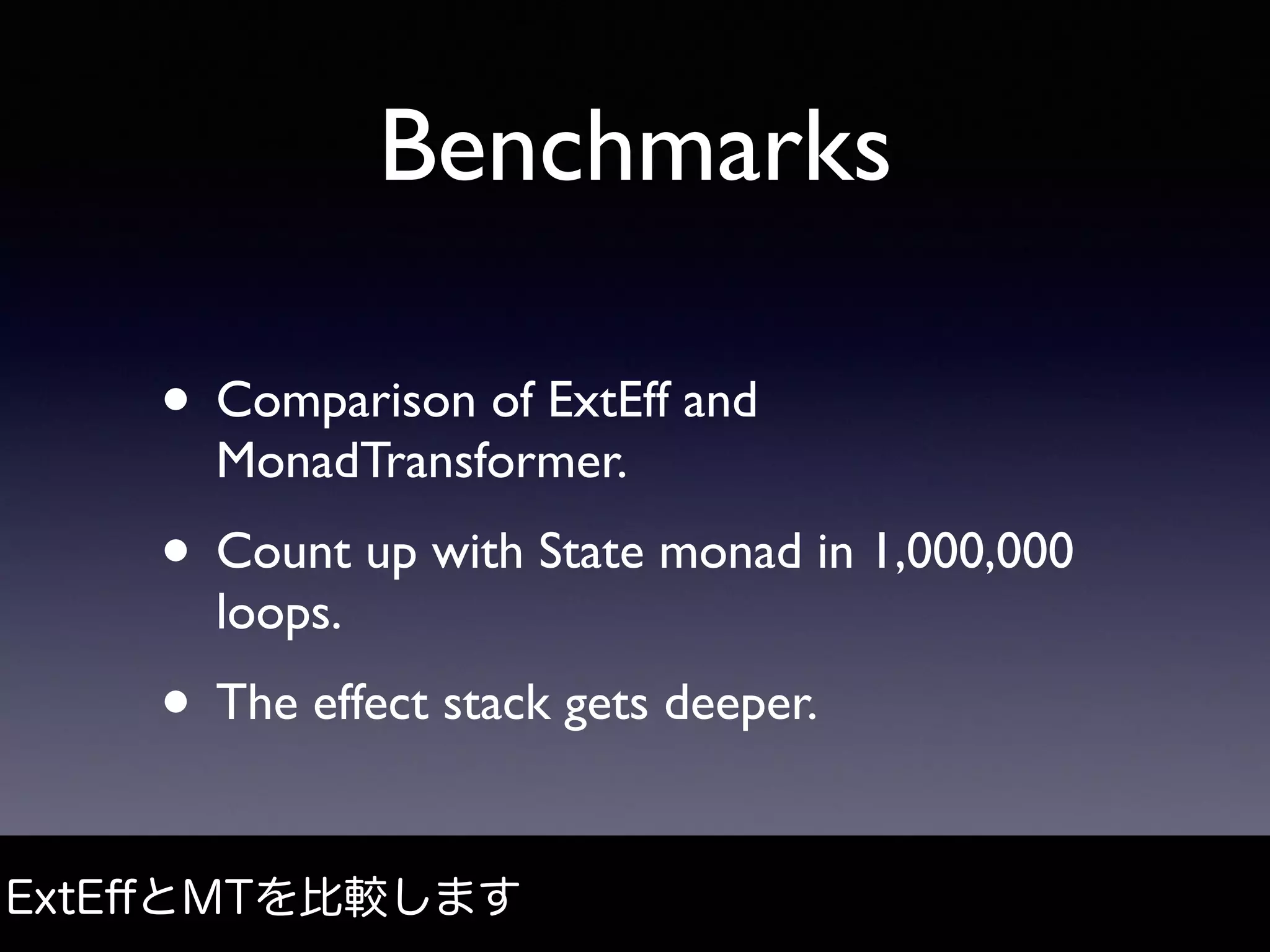
![Benchmarks in ExtEff
def benchEff(ns: Seq[Int])
: Eff[[A] => State[Int, A], Int] =
ns.foldLeft(Eff.Pure(1)) { (acc, n) =>
if n % 5 == 0 then for {
acc <- acc
s <- Reader.ask[Int]
_ <- Writer.tell(s + 1)
} yield acc max n
else acc.map(_ max n)
}
ExtEffのベンチマークコードです](https://image.slidesharecdn.com/scalamatsuri-180317071400/75/Extensible-Effects-in-Dotty-68-2048.jpg)
![Benchmarks in MT
MTのベンチマークコードです
def benchTrans[F[_]: Monad](ns: Seq[Int])
: StateT[F, Int, Int] = {
val m = StateT.stateTMonadState[Int, F]
ns.foldLeft(StateT.stateT(1)) { (acc, n) =>
if n % 5 == 0 then for {
acc <- acc
s <- m.get
_ <- m.put(s + 1)
} yield acc max n
else acc.map(_ max n)
}
}](https://image.slidesharecdn.com/scalamatsuri-180317071400/75/Extensible-Effects-in-Dotty-69-2048.jpg)
.runRec(0)
def benchTransS(): (String, (Int, Int)) =
Bench.benchTrans[[A] => StateT[Id, String, A]](1 to
N).runRec(0).runRec("")](https://image.slidesharecdn.com/scalamatsuri-180317071400/75/Extensible-Effects-in-Dotty-70-2048.jpg)
